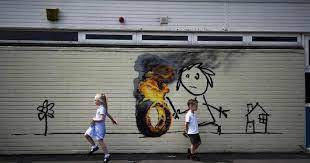
Kim dreads her children’s birthdays. When her son recently turned 11 she gave him a chocolate bar and a card - with food and fuel costs sky-rocketing, it was all she could afford.
The family’s north Wales home gets bitterly cold in winter, but heating remains a luxury.
Kim’s four sons - among 4.3 million British children living in poverty - walk round the house bundled in layers of clothing, dressing gowns and blankets, clutching hot water bottles.
“I try and make it out to be an adventure to them. But it’s not an adventure for anybody. They’re cold,” said Kim, whose husband lost his job as a builder six months into the pandemic.
Poorer families, already squeezed by years of austerity, are struggling more than ever as food prices surge - and things are set to get even tougher in April when energy bills soar by 54%.
Anti-poverty charities have called for urgent fixes to the country’s welfare system, saying growing numbers of families are being forced to choose between eating and heating, while parents like Kim skip meals so their children get enough.
“It’s shocking. We’re in 2022, living in an advanced country - apparently, but we’ve got families where people are starving,” Kim told the Thomson Reuters Foundation.
Inflation hit 5.4% in December, a 30-year-high, and could top 7% in coming months - welfare benefits will only rise 3.1% in April in what is the world’s fifth richest economy.
A likely increase in housing costs and a looming tax hike to help fund the country’s struggling health and social care systems will only add to the pressure.
The boss of budget supermarket Iceland, Richard Walker, made headlines recently when he said his stores were losing customers to food banks and hunger, amid rising food prices.
Kim, 37, used to cook everything from scratch, but is now reduced to feeding her children “cheap, processed crap”.
“That’s the only way I can describe it because it’s not food,” said Kim, who asked not to use her full name.
For two pounds ($2.70) she can put chicken nuggets, noodles and tinned beans on the table. Cooking a roast chicken with vegetables would cost more than four times that - money she does not have.
Kim and her husband miss most meals, surviving on toast.
It pains her to see the children missing out.
“Birthdays are heart-breaking,” she said. “What kid wants to open nothing on their birthday?”
RISE IN DESTITUTION
More than 31% of children in Britain were living in poverty in 2019/2020, up from 27% in 2013/14.
But the latest data predates COVID-19 and the jump in costs, which charities say have tipped yet more families into hardship.
Even before the pandemic, the numbers in extreme poverty had soared. More than a million households, including 550,000 children, experienced destitution in 2019, up 35% since 2017, according to the Joseph Rowntree Foundation.
Child poverty rates are particularly high in single-parent homes, larger families and those from ethnic backgrounds.
Single mother Jo Barker-Marsh, 49, who lives with 12-year-old son Harry in the northern city of Manchester, said child poverty remained hidden in Britain with many families sliding into hardship after relationship breakdowns and job losses.
Ten years ago, she was a filmmaker earning a good salary. But as a single mother raising a son with special educational needs, she could not resume a full-time career.
She took a part-time cleaning job, but lost it as the pandemic struck.
“There’s shame and humiliation that comes with poverty,” Barker-Marsh said.
“People think they’re better than us. They accuse you of scrounging.”
Poverty is not only exhausting but physically painful, said Barker-Marsh, who like Kim has reduced what she eats.
“The cold radiates from the centre of your being. Because you can’t eat enough food, your body doesn’t operate properly. You go to bed freezing and wake up in pain.”
‘UNFIT FOR PURPOSE’
Kim and Barker-Marsh are part of a project called Covid Realities, spearheaded by the universities of York and Birmingham and the Child Poverty Action Group charity, which has charted the lives of low-income families during the pandemic.
A report published last month called for major reforms to the social security system, branding it “unfit for purpose”.
The government was praised at the start of the pandemic for temporarily boosting Britain’s Universal Credit welfare payment by £20 a week, but it withdrew the top-up in October.
Anti-poverty campaigners want it restored urgently.
Dan Paskins of Save the Children UK said some European countries, including Denmark, Sweden, Norway and the Netherlands, had much lower child poverty rates.
This was largely due to better childcare support, so more parents were able to work, and higher welfare payments.
Britain, however, has seen significant cuts to social security in the last decade and is one of the world’s most expensive countries for childcare, Paskins said.
The Conservative government has rejected accusations of doing too little, pointing to measures worth 12 billion pounds to help struggling households and a 9-billion-pound package to counter rising energy costs.
But the massive hike in fuel prices, which will add hundreds of pounds to household bills, triggered further outrage this month after energy giants unveiled multi-billion-pound profits.
Some politicians have called for a windfall tax on their gains to help families facing fuel poverty.
Barker-Marsh said the higher bills meant she would have to sell her home, and accused energy suppliers of “dancing on the bodies of the poor”.
“My son is sick of being cold,” she said, her voice breaking.
"I'm really, really angry right now. There are so many of us. But no one is listening."
Source: Reuters
https://www.reuters.com/article/idUSL8N2UJ6JB
 FR
FR EN
EN AR
AR








